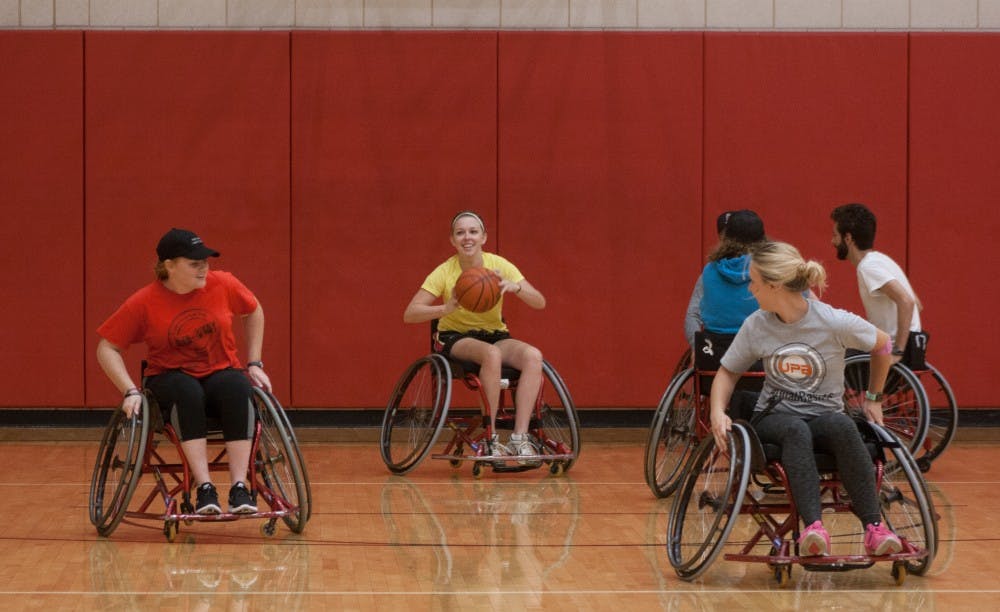It's not often that you see a group of basketball players who are not more than five feet off the ground, scoring almost no baskets and having a great time with it.
Wheelchair basketball is no ordinary sport.
Wednesday nights from 7 - 8 p.m. the office of Disabled Student Development hosts Adapted Sports Night. This is an opportunity that all students are welcome to participate in, where able-bodied and people with disabilities alike are able to explore the world of adapted sports.
The most popular sport played by participants is wheelchair basketball. Students are able to play five on five basketball games throughout the hour and experience a small aspect of what its like to be in a wheelchair.
Preston Radtke, a graduate student in the College of Communication, Information, and Media, has been involved with the program since he was an undergraduate student.
"It really changes your perceptions and it really teaches you to rely on other senses that you may not be used to," Radtke said. "I mean look at this, you're not able to walk, essentially, and you have to learn to shoot the basketball from a different angle and you have to certainly shoot it higher."
Radtke is in charge of the social media aspect for Adapted Sports Night. This year will be his first official year, though he has helped in the past. Radtke is able to use his connections made through his own experiences with adapted sports to help the DSD bring in more experienced players from time to time.
Growing up, Radtke was one of three visually impaired students at his high school. His interest in sports lead him to join groups playing adapted sports such as track and field, powerlifting and goalball.
Goalball is a game in which players are blindfolded and try to move a weighted ball with bells in it to score on their opponent's net.
"Everyone's blindfolded because there is different levels of visual impairment and blindness. For instance, my visual acuity is 2800 and I still have some vision, but someone may be totally blind. I guess, in theory, I could have a slight advantage," Radtke said.
Adapted Sports Night hopes to eventually have a night where participants play goalball, but for now, wheelchair basketball remains the main event.
While several students with disabilities participate, there are typically there are more able-bodied students playing. This, however, does not take away from the impact of the activity.
Lauren Slaven, a senior that is double majoring in meteorology and special education, found out about this group her freshman year, when it was advertised during Disability Awareness Month.
"Its awesome ... if you're in a wheelchair you're allowed to wheel around, go really fast, run into other people and still shoot," Slaven said. "It's so different from regular basketball. People who can shoot and who are really good at regular basketball can come here and just be terrible at it because it’s a different set of muscles."
Slaven had always enjoyed working with students who had disabilities. She also has a passion for basketball, instilled in her by her father from a young age.
While Slaven was not able to continue playing basketball due to an ankle injury, she couldn’t stay away from the sport, and Adapted Sports Night created the perfect alternative for her.
Adapted Sports Night also holds another significance. Those involved comment on how it helps them understand, to an extent, the challenges people with disabilities face and gain a new respect for what they have accomplished.
This is something graduate student Claire Woodburn, who studies student affairs administration and higher education, wants for people who participate.
"I just want students to get an insight on what it is to maybe not be an able-bodied person. Just to see a different experience, from someone else's point of view," she said. "For students to see that students with disabilities can also push themselves to do more than even able-bodied people can."
Woodburn is in charge of organizing the event and is pleased to see that opportunities such as Adapted Sports Night are helping change the world's vocabulary. "People first" language, or saying "people with disabilities" and not "disabled people" is becoming more commonly used.
The success of opportunities like Adapted Sports Night helps both able-bodied and students with disabilities alike. Breaking down barriers, like not knowing what people with disabilities go through, gives able-bodied students a chance to see things from a new perspective. It also gives students with disabilities a chance to experience the communal and welcoming atmosphere of Ball State as well as get out of their comfort zones.
Radtke believes that it also helps students with disabilities overcome possible anxieties of able-bodied students looking at them differently.
"I'm not going to lie, I can't see these people, but I can tell that most of them aren't very good at it," Radtke said. "They just have a really good attitude about it. You know, 'I missed that pass' or ' I missed that shot,' but 'at least I'm exposing myself to something new."





